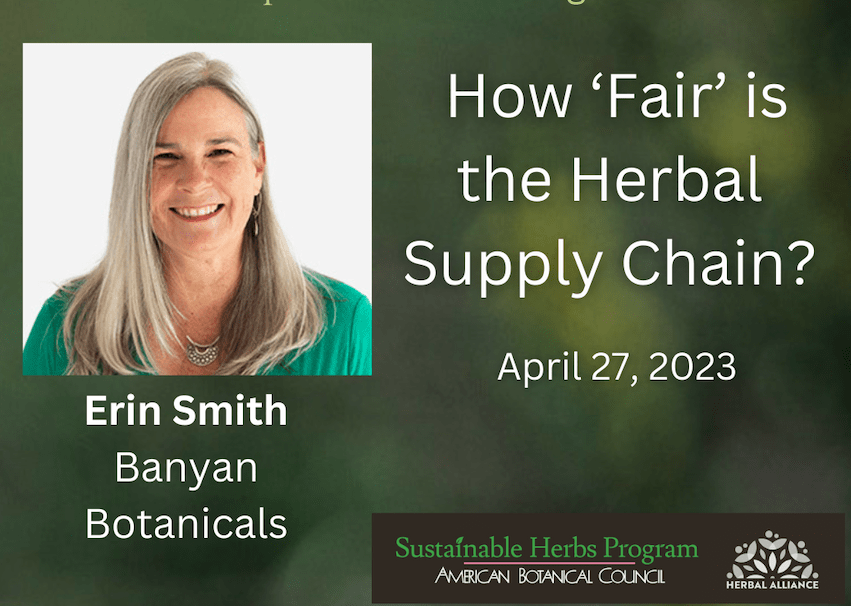by Ann Armbrecht, SHP Director
On April 7, 2023, with the Herbal Alliance, the Sustainable Herbs Program co-hosted a half-day conference, Why Prescribing Sustainable Herbs Matters. Below are highlights from the presentation by Erin Smith, VP of Herbal Science & Research at Banyan Botanicals, on fair trade at Banyan. If you missed the conference, I encourage you to watch the presentations here. Your purchase (for $10) supports our ongoing outreach from the conference.
Fair Trade at Banyan Botanicals
Fair certifications are slowly gaining more momentum in the herb industry. Yet it can be difficult to know what difference those labels actually make, especially amidst accusations (often correct) that fair trade is still not translating into a living income for many workers.
Erin Smith shared specific ways that becoming B Corps and Fair for Life certified has made a difference in how Banyan Botanicals does their work.
Some of these include:
- Fair for Life empowers Banyan to ask hard questions and to hold themselves and their growers accountable to knowing what is really happening on the ground. And it allows Banyan to feel confident that what they believe is happening actually is happening on the ground.
- Fair for Life certifies the whole supply chain. This means that Banyan is under as much scrutiny as the producers and farmers. Banyan needs to demonstrate that as a company it is operating under the same principles, worker wellbeing, fair wages, etc.
- The Fair for Life certification is a heavy lift. Banyan works with 200 herbs. Twenty-five are Fair for Life or Fair Wild certified so it’s a long journey to be fully certified. The practices have always guided their purchasing, it just takes time to become certified. Like any certification, it is a process of continuous improvement.
- Key principles of fair trade that are important in sourcing herbs include maintaining direct, long-term relationships with producers. Most herbs on the market are bought on price. Suppliers aggregate the cheapest material which companies in turn buy. Companies rarely have direct relationships with the source of the herbs. Relationships with their suppliers allows Banyan to have consistent high quality herbs and the producers have a steady market.
- Paying suppliers promptly and fairly is important to ensure that fair trade actually is a strategy for poverty alleviation. Sharing financial risk and providing pre financing are also important.
Challenges
- It is difficult to find certified ingredients. Only 12% of their pharmacopeia is Fair Trade certified and Ayurveda is even more niche. There is not yet enough demand to convince more producer companies that Fair for Life is worth their investment.
- Consumers don’t understand what Fair For Life means. The certification involves a lot of investments by a company. But a lack of consumer awareness means that many don’t understand why the products are more expensive or where that money is going. There needs to be more awareness building about why it is worth paying more for these products.
- With fair trade commodity crops, farmers do get a fair wage but only during the time of year when they are working on that crop. In fact, being a fair trade producer doesn’t necessarily mean you have a year-round sustainable livelihood. How to expand this so that it becomes a year round sustainable supply? Agroforestry can help with that, she explained, because it allows farmers to plant more diverse crops.
What To Do
- Buy fair trade herbs. By increasing the demand, we can create a greater supply.
- Educate clients to know where their herbs come from and the differences between sustainably and fairly traded herbs and the conventional ones.
- Ask questions. If a company can’t answer them, find another company.
Learn more about Banyan’s fair trade work here.


Comments